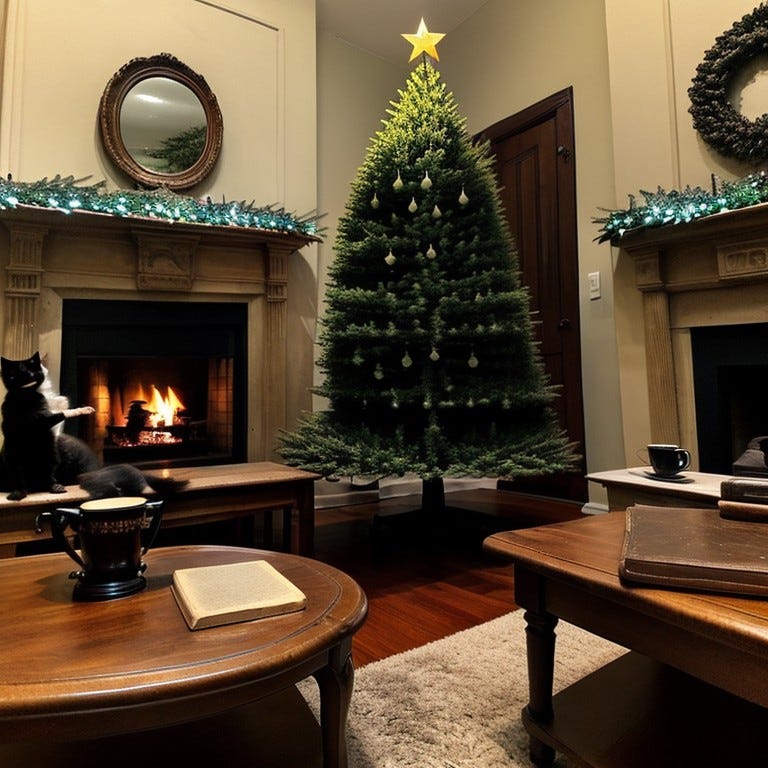Willow's Christmas mix, 2023 edition!
Hello everyone, updates and housekeeping announcements, and a little bit about the Advent and Christmas!

Hey everyone! Blessed holy day of Nativity for all those who celebrate. This will be a very short message from me. Today, I’ll update you on what’s happening with the Little Free Seminary, reintroduce it to the newcomers, then I’ll briefly discuss Advent and Christmas.
I began the Little Free Seminary newsletter and podcast just over a couple of months ago. Then I got COVID during the latter half of October. This time I actually got sick, and I lost the sense of taste for about 10 days. Then I got a cat in November. Between recovering from the virus and frantically trying to catch up on my schoolwork, I was not quite able to offer new editions for two months.
For those who are new here, my name is Willow. I studied at a seminary over a decade ago and majored in feminist theology and dropped out after I was burned out from my extensive involvement in the activist spaces during and following the season of Occupy Wall Street. I enrolled in a ministry training school almost three years ago and I am working toward diplomas in ministry and divinity, which is a journey that takes me through almost 100 credits of education.
My primary mission is to minister to and build communities among autistic people. This vision came to me in 2019 and is also informed by my own experiences and challenges with spiritual communities that are for the most part created for neurotypical folks and their needs.
My secondary mission, as you will see here, is to make theology accessible to all. So much of our cultures, politics, and collective values are influenced by how people believe about the higher being, about the world, and about themselves. As Christian theologians often say, “Lex orandi, lex credendi, lex vivendi.” That is, how we pray shapes how we believe, and how we believe shapes how we live.
It is my hope that a new edition of this newsletter and podcast comes out, more or less, weekly. The podcast is simply the “listenable” version of the newsletter, made with a computer-generated voice. I do this so I can save time — Several years ago I attempted to record my own podcast, and it took me 10 hours to produce a 20-minute episode! I’m not exactly a great public speaker and I can only talk so long before my throat begins to hurt. The pre-recorded intro and outro are, however, my own voice!
Now onward.
It’s Christmas Eve today in the Western Church, but it’s also the Fourth Sunday of Advent. This is quite rare. The last time this happened was in 2017, and after today, it won’t be until 2034.
Speaking of Advent and Christmas, my chronic pet peeve has been how early in a year Christmas music begins to come on the air. The local Christian music radio stations usually begin their non-stop Christmas music loops on Black Friday.
But in some liturgical traditions, for example in the Anglican and Episcopal churches, there is a distinction between the “Advent music” and the “Christmas music.” The Advent music is played beginning on the First Sunday of Advent and until the morning of December 24; then the Christmas songs are sung from the noon of Christmas Eve to the day of Epiphany on January 6.
Advent is traditionally considered a period of penitence quite similar to Lent, even sharing the liturgical color of purple, so the celebratory tunes of Christmas would be inappropriate. During the weeks of Advent, the darkness increases in the Northern Hemisphere.
Speaking of Christmas, most Protestant churches in the United States hold services on December 24 but not on the 25th. Today, since the Fourth Sunday of Advent coincides with Christmas Eve, many churches have canceled the usual Sunday morning service as well. If you are looking for a traditional Christmas morning service, check out any Episcopal or Anglican parish in your area.
Christianity has developed an annual cycle of feast and fast days, as well as weekly Bible readings, that is known as the liturgical year. A liturgical year begins on the First Sunday of Advent. While most traditionally-minded churches follow this calendar, including the Catholic Church, Anglican Church, and most Mainline Protestant denominations, the Evangelical churches do not typically follow the liturgical calendar aside from a few major days such as Christmas, Good Friday, and Easter.
It’s also worth noting that many Christians in the Eastern Orthodox traditions, most notably in Russia, may celebrate Christmas on January 7, following the old Julian calendar.
Whether your holiday plan includes Christmas celebrations, it is my sincere prayer that your hope and light increase during this final week of 2023.



